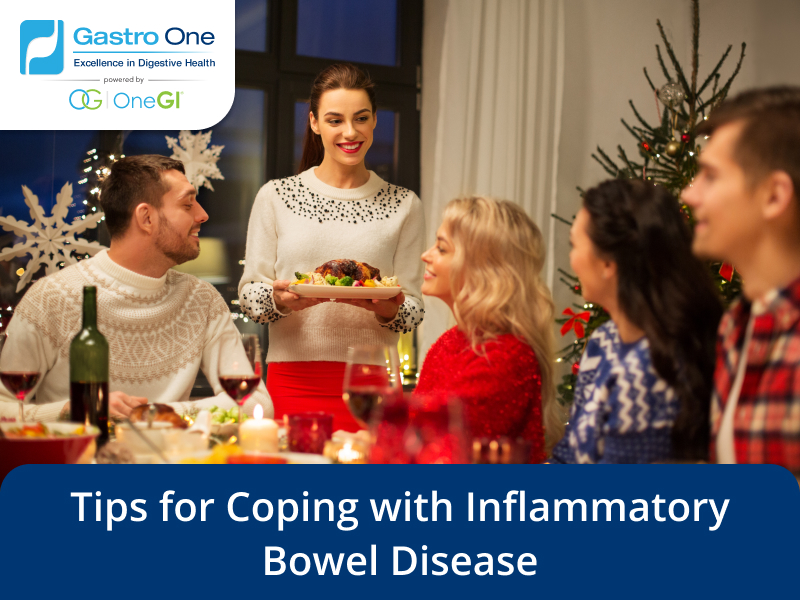
The holidays tend to show up wearing your sparkliest outfits: twinkly lights, cinnamon-spiced everything, and a constant stream of invitations. But if you live with inflammatory bowel disease, the season can feel a little more complicated.
While everyone else is digging into decadent desserts or planning cross-country travel, you might be quietly calculating bathroom proximity, food triggers, and energy levels. It doesn’t mean you can’t enjoy the festivities. It simply means navigating them with a little more intention.
IBD, whether Crohn’s disease or ulcerative colitis, can bring along symptoms like abdominal pain, fatigue, diarrhea, and urgent bathroom trips. High-stress weeks and indulgent meals can nudge symptoms into flare-up territory, which is why holiday prep matters.
With some thoughtful planning, you can keep coping with IBD while enjoying the celebrations without sacrificing your health.
The Gastro One experts list below eight simple tips that can help you move through the holiday season with more confidence, ease, and yes, more joy!
Table of Contents
Challenges IBD Patients Face During the Holiday Season
People living with IBD often find the holiday season exciting but also uniquely challenging. The mix of travel, rich meals, and shifting routines can make symptoms harder to manage and flare-ups more likely. With a little awareness, it becomes easier to navigate these hurdles.
Common challenges include:
- Large, rich, or unfamiliar holiday foods can trigger symptoms
- Irregular meal times or overeating during big gatherings
- Increased stress from travel, hosting, or family dynamics
- Forgetting medications during busy schedules or trips
- Limited bathroom access when traveling or attending events
- Fatigue from packed social calendars and disrupted sleep routines
Effective Tips To Cope With IBD During the Holiday Season
1. Bring a Dish That Loves You Back
Walking into a big holiday meal without a safe food option can feel like stepping onto a tightrope. Bringing a dish you know your body tolerates gives you an anchor. It doesn’t need to be fancy. Think simple, nourishing, predictable.
Better yet, bring enough to share so you feel part of the table rather than the person eating the “special plate.” This small act of planning often takes the pressure off and helps you relax into the gathering.
2. Communicate Before the Chaos Begins
Holiday hosts always want everyone to feel comfortable, but may not know what you need unless you tell them. A quick conversation ahead of time can prevent awkward moments and unnecessary discomfort.
You can let them know about any dietary needs or mentions, like you’ll be bringing your own dish. Most hosts appreciate clarity. And if someone offers to cook for you, guiding them through substitutions instead of listing “off-limit foods” can make things easier for both of you.
3. Don’t Skip Meals Before the Big One
It’s tempting to “save room” for the feast, but going into a large meal starving is a setup for discomfort, especially if you are suffering from Crohn’s disease. Eating small, regular meals throughout the day keeps your digestion steady and helps prevent overeating once dinner is served.
When you’re not overly hungry, you’re able to choose foods more intentionally and enjoy them without pushing past your comfort point. It is an excellent way of managing Crohn’s disease during the holiday season. Remember, your gut likes steadiness—not surprises!
4. Be Thoughtful With Drinks
Holiday beverages have a sneaky way of creating trouble. Sugary punches, creamy cocktails, carbonated drinks, and even certain types of alcohol can trigger symptoms.
Water is always a safe go-to, but if you want something festive, think flavored water, gentle mocktails, or drinks you’ve already tested. If you plan to drink alcohol, moderation is your friend, and sticking with what you know your system tolerates is even better.
5. Practice Portion Control and Mindful Eating
Holiday plates tend to get piled sky-high, but large portions can overwhelm a sensitive digestive system. Eating slowly, tuning in to hunger and fullness cues, and taking smaller servings can help you enjoy your favorite dishes without discomfort.
Think of it as pacing yourself, not restricting yourself. When you eat mindfully, you give your gut a chance to keep up, and you’re far less likely to trigger bloating, cramping, or post-meal fatigue.
6. Protect Your Peace
This season can be loud, busy, emotional, and overscheduled. Stress is a known IBD trigger, and managing it is just as important as managing food choices. Permit yourself to decline events, leave early, step away for a breather, or simplify your plans.
Boundaries aren’t rude. They’re part of your IBD treatment. Your holiday experience matters just as much as anyone else’s.
7. Reach Out for Support When You Need It
If symptoms start to rise, don’t white-knuckle it. Reach out to your gastroenterologist or dietitian to discuss what you’re experiencing. Sometimes, small adjustments can prevent a worsening flare.
And if you’re feeling emotionally overwhelmed, a GI specialist can make the season feel far less isolating. You don’t need to carry this alone.
8. Listen to Your Body Above All Else
Perhaps the biggest holiday skill of all is tuning into your body and honoring what it tells you. If you need rest, take it. If a dish feels risky, skip it. If a tradition no longer works for you, adapt it.
Holidays aren’t about perfection; they’re about connection and comfort. The more gently you treat yourself, the more you’ll enjoy the days that really matter.
Are There Any Tips to Practice Self-Care If I Have Crohn’s Disease?
The best way to manage Crohn’s disease is to follow a steady, supportive routine that keeps your body balanced and reduces the risk of flare-ups. It doesn’t have to be strict; just a few daily habits can help you stay ahead of symptoms and feel more in control of your health.
Helpful elements of a Crohn’s disease self-care routine include:
- Eating small, regular meals
- Staying well hydrated
- Taking medications at consistent times
- Gentle movement like walking or stretching
- Prioritizing restful, consistent sleep
- Knowing personal food triggers
- Tracking symptoms daily
- Contacting your care team early if issues arise
Lifestyle Tips for Managing IBD
Living with IBD isn’t about perfection; it is about creating routines that keep your gut, stress, and schedule in better balance.
Follow some helpful IBD lifestyle tips, including:
- Eating regular, balanced meals
- Staying hydrated throughout the day
- Managing stress with breathing, stretching, or short breaks
- Getting consistent, high-quality sleep
- Moving gently each day
- Avoiding known trigger foods
- Planning for travel or social events
- Keeping up with medications and appointments
When to Consult a Doctor
Sometimes even the best preparation leaves you with questions, especially if you’re planning a trip, feeling new symptoms, or anticipating a stressful stretch of events. If that’s the case, connecting with a specialist can give you clarity and peace of mind.
The team at Gastro One offers expert care for all digestive concerns and can help you understand your triggers, manage symptoms, and create a plan that supports you through the holidays and beyond.
Why Consult Gastro One
Gastro One brings together experienced physicians, advanced diagnostic tools, and compassionate, personalized care. Whether you’re recently diagnosed with IBD or have been experiencing digestive concerns for a long time, our team can provide you with the best inflammatory bowel disease treatment.
We can guide you toward better digestive health. Holiday season or not, we’re committed to helping you feel supported, informed, and in control of your condition.
Ready to feel more confident this holiday season? Call 901-755-9110 or visit to schedule your appointment today.



